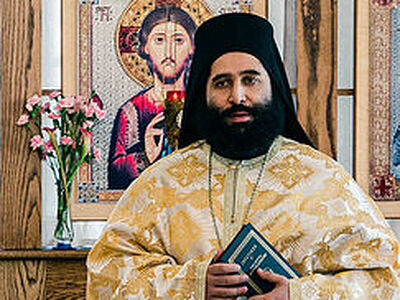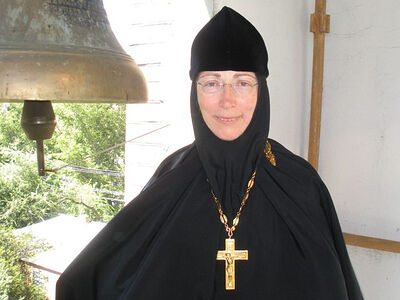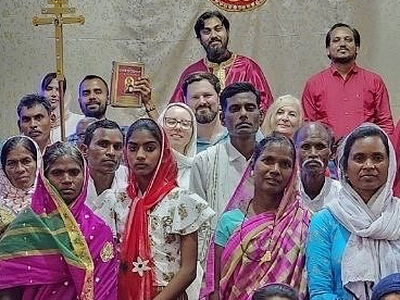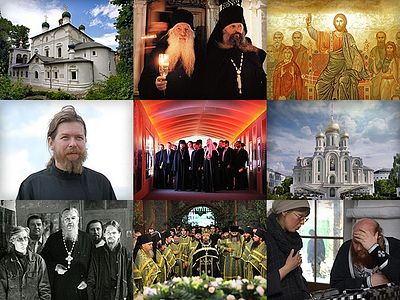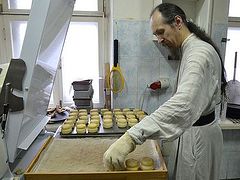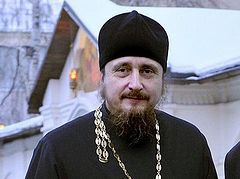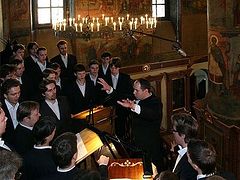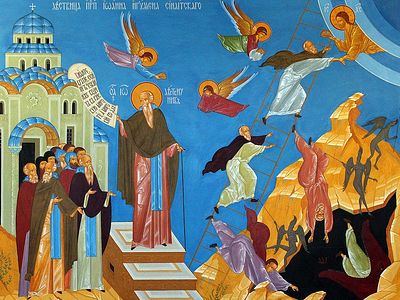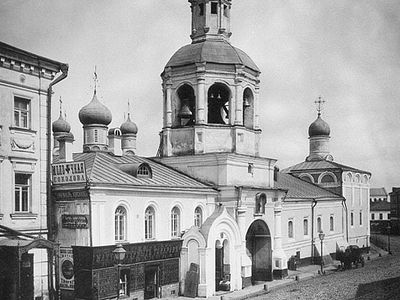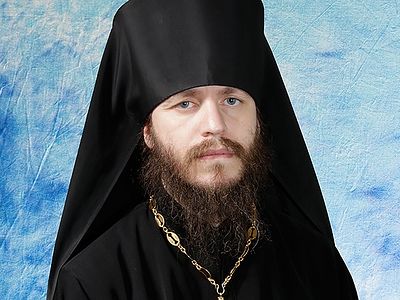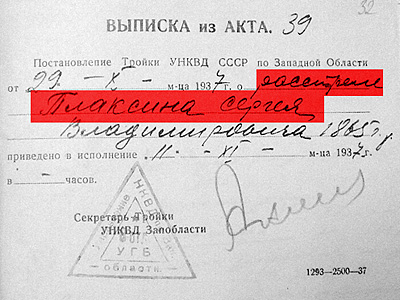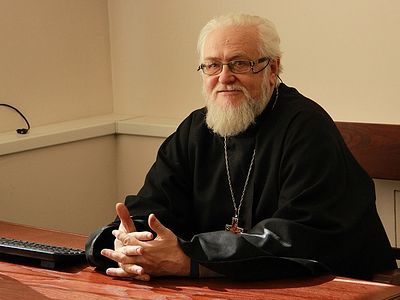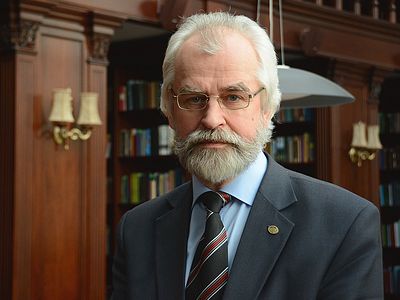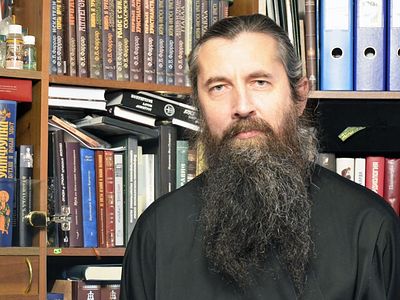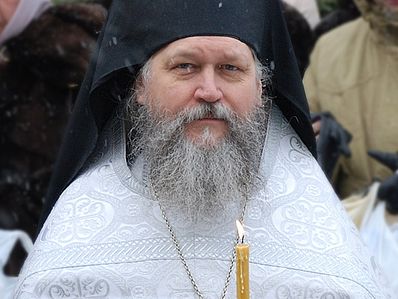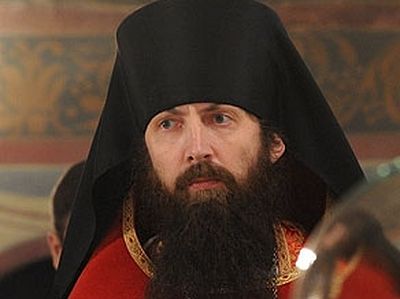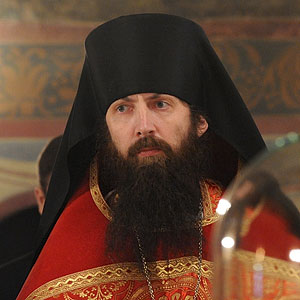 Hieromonk Luke (Aule)
Hieromonk Luke (Aule) I came to Sretensky Monastery in 1996, in December. I had a friend here, Roman Danelyan—now Hieromonk Cleopa—who had come to the monastery half a year before that. We had been friends since childhood, and so it was completely natural that we came to believe in God together, started going to church together, partaking of the Body and Blood of Christ, talking about God. We lived in the same town, Adler, near Sochi, in the same apartment building, we had the same stairwell and doorway to the street, but I lived on the fifth floor and he on the first. After Roman left for the monastery, I decided to visit him. So I came as a guest to see him, and later I myself came to live here in the monastery.
Did you family know when you left to enter the monastery for good?
Coming to a decision and leaving for the monastery all happened in 24 hours. Late one evening everything came to a clear focus; I told my father and brother that I was leaving for good, that I couldn’t live in the world any more. The next morning I got up, bought a ticket, in the evening got on the train, and left. It all happened in one day. That was a very sorrowful day for me; I was leaving behind everything in the world dear to me, especially my father....There are some things you can’t express.
Batiushka[1], do you remember your first day in the monastery?
That was an unforgettable day! I arrived early in the morning and went into the cell [monk’s room] of my friends; Father Cleopa (then still Roman) and Father Nathaniel (then still David) were sleeping. I left my bag in their cell and went into the church just as Father Tikhon came out of the sanctuary to give the homily. His first words were, “Today the Holy Gospel gives us the Good News of how the Lord went ashore to the country of the Gadarenes [Mark 5:1-17], and there met him a man who was demon-possessed.” I hung my head and wept: “That’s me, the demon-possessed Gadarene.” I will remember that homily my whole life.
Father Luke, does anything stand out in your memory from your first talk with Father Tikhon?
He said, “You’ve come to us—good for you! What kind of obedience[2] shall we give you? Let’s have you wash dishes!” I said, “Batiushka, with great joy, I will wash dishes.” “And where will you stay?” “With Roman and David.” “And where will you sleep, and what on?” “It’s not important, I can sleep on the floor; it’s all the same to me.” And Roman began saying, “No, no, Batiushka, he’ll sleep on the bed and I’ll be on the floor.” And we began to bicker. Finally Father Tikhon stopped us and said, “I’ll sleep on the floor.” We all laughed. That was my first talk with him.
How long did you have that obedience in the trapeza?
I worked in the trapeza for about half a year. We worked from morning to evening; and sometimes we prepared food for the next day even into the wee hours of the morning. There were only 3-4 of us working in the trapeza. For the cooks, there were two shifts; they took turns: two days on, two days off. But we novices had no days off, not even Sunday. We did everything: washed the dishes, prepared food for the next day, cleaned fish, set and cleared the tables, mopped the floor…And I was boundlessly happy. You know, if the abbot gave me again today the obedience of washing dishes in the trapeza, I would joyfully agree.
The monastery church has an excellent sound-system: each word from the reader, each note from the choir, is clearly heard in every corner of the church. How did you get the obedience of sound technician and electronics engineer?
When I came to the monastery, I wanted to bury my talent in the earth. I thought that electronics was unclean, impure. But God humbled me, brought me to my senses, and gave me this obedience so that I wouldn’t say or even think such foolishness any more. It’s obvious that electronics can be used for good purposes; it can be used to help people who, thanks to a good sound system, can clearly hear the word of God and nourish their soul. There’s nothing pernicious in this skill.
I’ve been carrying out this electronics obedience now for more than ten years. This is how it started: For the canonization of Hieromartyr Hilarion, we needed to put an amplification system in the bell-tower so that the overflow crowds outside the church could hear the divine services. The father-steward let the cat out of the bag about me when he told someone, “What a waste to hire specialists when we have someone right here who worked with computer systems when he was in the world.” And so they gave me my first obedience in that field—to set up a sound-broadcast system in the bell tower. After that, this type of task began to increase little by little. Father Vladimir, who did the telephone connections in the monastery, became ill. And so they gave me the task of promptly solving a problem with the telephone exchange system. I bought a new system and re-did everything. Now the monastery has a very powerful telephone-exchange system, one of the best. And the main thing is that it has a large potential.
Father Luke, tell us what the life of the brothers was like when Sretensky Monastery was first being restored.
Of course, life in the monastery was different then. There weren’t many brothers. We prayed together. We had a rule we did together in the church; at the end of it, we all asked forgiveness of each other. There were night-time services, it seems to me twice a week, from 3:00-5:00 a.m. All obediences, without exception, including in the church, were carried out by the monastery brethren. That really united us.
Tell us, please, in more detail about your life in the monastery.
It was very difficult for me at first in the monastery, but I understood that there was no other path for healing my soul wounded by sin. I didn’t trust the thoughts that kept popping up in my mind, such as: “Leave the monastery; there’s no reason for you to be here. Go back to the world—everything will be great.” Not trusting myself and the thoughts of my mind, I completely gave myself and my will in obedience to my spiritual instructor, Archimandrite Tikhon. I felt like I was living in the middle of a fire, it was so difficult. But with the passing of years, during which I prayed and worked as much as I could, according to my strength, I began to see that my soul little by little was moving away from that fire, those torments, that had been in me, and was coming into peace and calm, which gave me more and more joy with each passing year. I also understood that there is nothing in life better than monasticism, no better path to the knowledge of God. What could be more joyful than fellowship with God, communion with God? And what do people need more than the Word of God, preaching about God? It’s so hard for people in the world; they need help, someone to stretch out a hand.
And when did they bless you to wear a podrasnik[3]?
That was on Palm Sunday, the Entry of the Lord into Jerusalem. For me, that was a special day, when I consciously began my spiritual journey to the Lord through the Church, in the church of God. I am very glad that specifically on that day, the Lord visited me and gave me the uniform of a soldier of Christ, which one should always wear, give thanks to the Lord, and never take off.
Tell us about when you took monastic vows.
I was tonsured a monk on the commemoration day of Hieromartyr Hilarion, 23 December.
What did you think when you heard the words, “Luke is tonsured…”? [his new monastic name]
My first thought was, am I really receiving the name of the apostle and evangelist Luke, who was an icon-painter? How astonishing, I thought; because I really did love, secretly love iconography. Is my heavenly protector now really going to the evangelist and icon-painter Luke?
I was made worthy of the deacon’s rank about half a year later.
Batiushka, what memories do you have of your first visit to the monastery’s skete?
A half year after I entered the monastery, in summer all the brothers went to Diveevo with Father Tikhon. And from there we went to Riazan; there was no skete there then, only ruins, a pile of bricks, that’s all. We slept on heaped-up hay.
And what do you remember about your trip to Diveevo?
It was a wonderful trip. Traveling with Father Tikhon in general for us was always a great joy: we receive from him both words of edification, and prayer. We arrived in Diveevo, and the nuns proposed that our monastery choir sing the service—at that time our choir was quite small, only five brothers. We sang, did our best; and the nuns were pleased.
In 1999, you took part in the collection of aid for the soldiers in Chechnya…
Those collections took place several times. It was a joyful task, a joyful obedience, despite the fact that we became very weary, because there were so many packages with food and other things. All of Moscow around the clock brought things for Chechnya. But somehow, by the mercy of God, everything worked out. The main thing was that people united with each other. I remember that many Muscovites came to help in any way they could. People came who didn’t have anything to give; they packed bags and packages and wrote notes of encouragement for the troops on each of them. It was wonderful that people responded with such open hearts for the sake of a common need.
How did you feel that day when all the brothers were blessed to study at the seminary which opened at Sretensky?
I had earlier studied in the correspondence course of the seminary at Holy Trinity-St Sergius Lavra. I dreamed about studying in person, directly with professors and other students. I had been concerned that I never had time for preparation. So when I heard that we were going to have a seminary at our monastery, I asked Father Tikhon if he would bless me to study in person at the classes. I believe that any task should be done diligently, with love, and with fear, since every task is a divine task, given by God. And when Father Tikhon gave me this obedience, for me it was a great joy. “Now,” I thought, “at last I will be able to study for real.”
Of course, the electronics-obedience was not withdrawn, so it was very difficult; but I combined it all. Of course I became very tired, but I received great consolation; when I got my education, I understood: what a great thing even if you only understand when there are mistakes, when something is not correct; and you know in what books to find the information for correcting these mistakes and for broadening and deepening your knowledge.
How did you study? What kind of instructors did you have?
The whole time we had excellent, skillful instructors. It was very interesting. I approached every subject with great love, and tried to learn it as fully as I could.
I remember Alexander Nicholaevich Uzhankov. We become friends, we still meet, talk, and always find many interesting topics for conversation. He is a gifted instructor and a “walking encyclopedia”. Under his guidance I prepared my term paper on the concept of “mental activity”, that is, inner, noetic prayer, from one of the ancient Russian sources.
My diploma paper, about the Jesus Prayer, was written under the guidance of Sergei Nicholaevich Govorun, now Archimandrite Kirill of the Kiev-Pechersky Lavra.
With great thankfulness I remember those instructors who were demanding, even strict, with us students. For example, Protopriest Maxim Kozlov. He was always strict; but with the passing of time, you understand that the lessons he taught are absolutely essential for us.
In addition—thanks to the tireless efforts of Father Tikhon—gifted scholars and theologians often visited us. To this day, I listen with great pleasure to the lectures of Professor Alexei Ilyich Osipov of the Moscow Theological Academy.
You became a priest while you were studying at the seminary?
Yes, I became a priest when I was studying in the third course.
What happened with you before you were ordained to the priesthood?
That was an amazing incident. Father Tikhon asked me to write it down.
I was at our skete of Seraphim of Sarov, and an old illness started up again. When I had been in the army, I somehow chilled my facial nerve; and since then, it flares up from time to time, a very sharp kind of pain. That nerve started acting up again at the skete, and I needed to go to Moscow for treatment. Not long before our departure, I was talking with Igumen Pimen. He has friends who are doctors. He and I are sitting there, and we see a large number of wasps flying around. Father Pimen said, “My doctor-friends say that this year many people died from wasp stings. A person swallows a wasp, it stings him on the tongue; the person suffers terrible head-pains and then dies.” It turned out that this wasn’t—and isn’t--true; but we didn’t know it at the time, and ended our conversation.
The very next day I was sitting in the trapeza, and a wasp flew up to me, stung me on the tongue, and immediately flew away. And sure enough, my head was seized with terrible pain; and I felt that I was dying. A kind of pre-death state…fearful. I remember how I got up from the table and told my brothers, “A wasp just stung me in the tongue.” Of course I immediately remembered what Fr. Pimen had said. I walked down the corridor thinking, “Well, that’s how it all was: you were living for awhile—and now you are dying. How quickly it all happened.” And at that moment, a thought came to me—a sinister and terrifying voice said to me—“You are mine, because you have malice against one of your brothers hidden in your heart, and you don’t want to forgive him. You belong to me.” This voice filled me with horror; it was like Hell itself. I thought, “O Lord, have mercy on me! What is this? Where is all this from?” I was gripped with icy fear, worse than in the beginning.
And then I stopped thinking about death; a different thought came: “And why should I die? We have to do some kind of injection, find an antidote.” I quickly ran to Fr. Seraphim. He did everything, although it turned out later that it wasn’t necessary. I went outside. Firstly, my shoulder hurt where Fr. Seraphim had given me the shot; secondly, the facial nerve hurt a lot; and thirdly, my tongue hurt terribly. I sat down.
Father Tikhon came up to me, put his hand on my head and said, “Well, is it painful?” I said, “It’s nothing, Batiushka, just a little ordinary pain.” “No, it’s not;” Batiushka said, “it hurts a lot! You know, it’s not uncommon for such tests and temptations to happen before an ordination.” At that time I hadn’t known that they were going to ordain me. Batiushka said, “Tomorrow we’ll take you with us when we go to Moscow—get you some treatment.” And we left in the morning for the monastery.
And on the road to Moscow, Fr Tikhon’s telephone rang. It was his secretary Nadezhda. “Father Tikhon, the Patriarchate asks you to call.” Batiushka stopped the vehicle by a wheat field, dialed the number, talked for awhile, then got back in the car and turned to me and said, “By the way, Luke, the Patriarchate called because of you.” I was perplexed, and thought, “What could I have done, that they would call?” “Yes, yes,” he said, “because of you. Thank God that we took you with us when we left for Moscow: tomorrow you must take all the necessary things and go to Hotkovo—His Holiness the Patriarch is summoning you for ordination as a hieromonk [i.e. priest-monk].”
Early the next morning I went to Hotkovo; and His Holiness, our ever-memorable Patriarch Alexius II, ordained me as a hieromonk—on the feast day of Batiushka Seraphim of Sarov.
And I, when we had been leaving the skete the day before, had been so sorry that I was going to miss the skete’s feast-day. I had been having thoughts like, “It’s because of your sins—Batiushka Seraphim doesn’t even want to see your face.”
Batiushka, did you regard your seminary-studies any differently after your ordination to the priesthood?
I consider it very important that I never refused any obedience that was given to me. When I was ordained a priest, I was studying in the third year and had the opportunity to communicate with remarkable instructors. We had priests who taught pastoral guidance not only from books but also directly from their own broad experience. For example, how to correctly serve the sacramental rites and various other services; to all the questions which came up during the process of serving, I found with these batiushkas deep and learned answers. I was taught where to find the sources from which to draw the knowledge I lacked. During my studies in the fourth and fifth years, I received exactly what I needed as a priest.
Did you have to miss classes very often?
I never skipped a class unless I had to. Of course, sometimes at my obediences there were rush jobs. At that time, monastery buildings were being built; and I took part with the workers and engineers in designing and putting in place all the communication and electrical systems. Sometimes unfortunate things would happen; once they poured concrete on an electrical line in the wrong place. That night I had to take a jackhammer and make things right. Sometimes I had to work all night with a jackhammer and then take an exam in the morning. I would think, “How can I possibly take an exam?” But I would take the exam; and it was interesting, once the instructor even said, “Wonderful. What other literature did you use besides what I gave you?” It was amazing how the Lord covered the gaps in my education.
Was taking exams hard for you?
Yes, very hard, because I was determined to learn everything and not copy or cheat in any way.
Continuing the answer to your question about our instructors, I’ll tell you a story.
My first and last exams were with Alexei Constantinovich Svetozarsky [“Svetozarsky” means “Light-radiating”]. The first time was History of the Christian Church, and he gave me a grade of “unsatisfactory”. And when I took my last exam with him, he gave me an “excellent”. I told him, “Alexei Constantinovich, you know, my first exam with you, you gave me a ‘two’.” He began to laugh and said, “Good—you’ve grown up.” That for me was a very joyous summation of my studies. I loved Russian church history very much; but Alexei Constantinovich throughout all those years had never given me a “five” [“excellent”]. At the end of the fourth year, having received one more “four”, I had said to the instructor humorously, “Alexei Constantinovich, I have a big dream.” Perplexed, he had looked at me with a smile and asked, “About what?” And I had answered, “To receive at least once in my life a ‘five’ in your subject.” He was tickled pink at the idea, chuckled and said, “That’s quite possible; only you’ll have to learn a little more.”
For a while, you were a “day assistant” of the seminary pro-rector [provost].
I was one of his assistants while I studied there. About two years. I was responsible for keeping track of the students’ obediences, their sleep, their “exits” into the city…It was extremely wearing. Working with students is interesting but difficult and complex. I can’t explain it, but during the days when I was on duty, I felt like a squeezed-out lemon.
Batiushka, tell us about the day you graduated from Sretensky Theological Seminary.
That was a wonderful day, unforgettable. Our diplomas were given to us by Vladyka Alexei, archbishop of Orekhovo-Zuevo. Something took place inside me that day, it was so joyful.
What did seminary give you?
I am grateful to the Lord, to the Mother of God and to Batiushka Tikhon that they gave me such joy and happiness—the chance to study. Knowledge is a firm foundation to use in building the salvation of one’s soul. Of course, such spiritual building is based on firm faith and fulfillment of the Gospel commandments. For us, the path of ascension to God is traveled under the guidance of the holy fathers. They teach us how to correctly fulfill the Gospel commandments.
What do you remember about the reposed Hieromonk Mitrophan?
When I came to the monastery, he was still a hierodeacon. We looked up to him as a model. Such a solid, well-grounded monk. We all took him as an example. He worked as the treasurer and carried out his obedience splendidly. He was very kind, loving, and endlessly forgiving.
I remember when I was working in the sacristy. There was never a free minute; at times we worked several days in a row around the clock. I am not exaggerating when I say that it was not even possible to leave and do our cell-rule. There was a lot of work: there was no mosaic-tiled floor which doesn’t require much upkeep, there was no stone altar-table, which doesn’t need vestments. At that time, we had to constantly change the vestments on the Holy Table, keep everything neat and clean in the altar-area, vacuum, take the carpets outside—there were a lot of them—hang them up and beat the dust out. When the feast days ended for us with the transfer of the relics of Holy Hieromartyr Hilarion, I asked permission to go to Matushka Matrona, who had just been canonized. I went to the father-treasurer and said, “Fr. Mitrophan, give me a little money for transportation; I want to go visit Matushka Matrona.” And he gave some, of course. And then he took the whole money-box full of change, poured it all into my hand, and said, “Take it, and buy yourself something at her Protecting-Veil Monastery.” And I bought a large icon of Matushka Matrona. I remember how I blessed it directly on her relics, and was very happy.
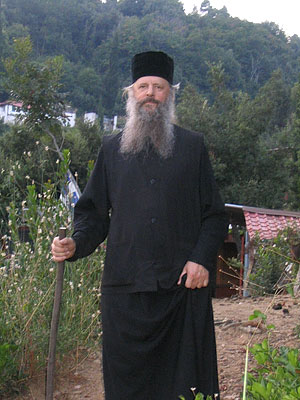 Schema-archimandrite Anastassy on mt Athos
Schema-archimandrite Anastassy on mt Athos Batiushka Anastassy was always a big consolation. He never talked much; he would say only a few words. He was a real monk to the very depths of his heart, a lover of podvig, of monastic labors, a mentor; a person of wondrous kindness, always ready to stop what he was doing, listen carefully, give practical advice and [through confession] remittance of sins. When he died, it was a great loss for all of us.
And you visited Mount Athos with him….
Yes, he was the eldest among us. I’ll tell you a story. I love adventure. It was a great pleasure for me to climb around on the mountains of Mt Athos; I have loved mountain-climbing since childhood—I grew up in the Caucasus, amidst the mountains. And I climbed the mountains on Athos, too. There are rock faces so sheer that you can go down them to the seashore only by rope. Once I went and got a blessing from Fr. Anastassy, “Batiushka, let me to go down to the sea.” I went to the edge of the cliff—what a drop!--a hundred meters [yards] straight down to the seashore. I asked one of the monks, “How do you get down there?” “Just follow me.” He took the free end of a securely-tied rope and said, “Grab the second rope, and let’s go.” He went right over the edge of the precipice and started down the rope. I began to follow his example, but then froze. “Lord, have mercy; if I make a single imprecise move on the rope with my hand, I’ll be smashed to bits. Such huge rocks below, nothing will be left of me….I can’t do it.” And I called to him in a loud voice, “Listen, is there some other way down, an ordinary way?” He answered, “You can take a half-kilometer [1/3 mile] path.” And he continued his swift descent on the rope. I went the roundabout way, got to the sea, roamed about a bit and admired the scenery. But I didn’t want to go back up by the roundabout path. “I’ll climb up on the rope; after all, it’s easier to go up than down.” And I started climbing, got about halfway up, and naturally got tired, because you had to keep pulling yourself up by that rope in your hands. I decided to take a rest. There was a small ledge there and I stood on it, holding onto the rope. And then…I looked down, a straight drop of 50 meters [yards] and big rocks at the bottom. I started to feel dizzy, and sick to my stomach. What should I do? I’m afraid to go down, and I’m afraid to go up. What can I do? I was desperate. But then I got control of myself, overcame my fear, climbed to the top and went to the guest house as if nothing had happened.
The next morning I again went to Batiushka Anastassy, having told no one of what had happened, and said, “Batiushka Anastassy, bless me again to go down to the sea.” And he said to me very strictly, “You’re not going anywhere. Stay here in the monastery. I don’t bless you to go down there, I don’t bless it.” I understood; it was obvious that the Lord or the Most-Holy Mother of God had revealed my adventure to Fr. Anastassy. He had felt everything; that’s the kind of person he was—Batiushka Anastassy.
Interview by Hieromonk John Ludishchev
[1] Batiushka: an endearing Russian word for a priest, pronounced bah tyoosh kah.-trans.
[2] Obedience is the work assigned to someone in a monastery.
[3] Podrasnik is monk’s cassock.


